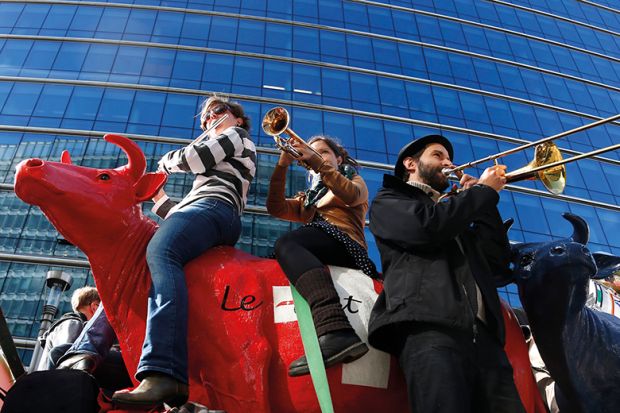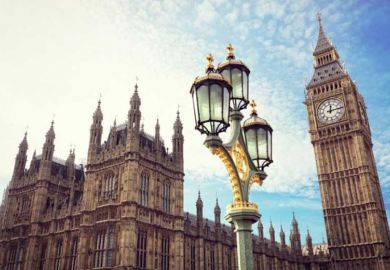Individual countries are failing to champion European Union research spending, raising doubts about the bloc as a serious funder of science, university lobbyists in Brussels have warned after a recent budget summit ended in deadlock.
In recent years, Brussels policymakers have talked up research and innovation as a key part of what the EU does, proposing a record €100 billion (£85 billion) budget for Horizon Europe, a spending package starting next year. The European Parliament has been even more supportive, backing a budget of €120 billion for the seven-year programme.
But when it comes to the crunch, EU member states have fallen back into old habits, putting their weight behind spending items seen as national priorities rather than supporting pan-European investment in research and innovation, observers warn.
“Nobody defends research and education,” said Kurt Deketelaere, secretary general of the League of European Research Universities. “Nobody is making a priority of this at the member state level.”
At inconclusive talks over the EU’s 2021-27 budget on 21 February, the French battled to defend agricultural subsidies, while eastern states such as Hungary prioritised redistributive “cohesion” funding aimed at narrowing the continent’s east-west prosperity gap.
Meanwhile, a group dubbed the “frugals” − the Netherlands, Denmark, Austria and Sweden – tried to keep a lid on EU spending.
The result was that even a plan to cut the Horizon Europe budget by €2.6 billion failed to gain traction.
“We’re quite worried about the fact that there is no more emphasis placed on research and innovation and the need to invest more ambitiously,” said Enora Pruvot, deputy director for funding and governance at the European University Association.
Member states demonstrated a “lack of commitment towards the mutually agreed ambitions that Horizon Europe reached last April”, said Christian Ehler, a German MEP and lawmaker deeply involved in crafting the programme.
The “frugals” tend to do well out of EU research schemes in terms of winning funds, a reflection of their strong science systems. However, that is often trumped by a domestic political need to limit payouts to Brussels.
For example, the Dutch prime minister, Mark Rutte, is under great pressure at home to keep the budget down, said Professor Deketelaere, even though “his own universities will suffer drastically from this attitude”.
Meanwhile, said Ms Pruvot, France and Germany, the biggest contributors to the EU budget, “do extremely well in Horizon 2020 [Horizon Europe’s predecessor] and might do even better in Horizon Europe. But it’s just one out of several priorities.”
Ultimately, while many countries accept that research and innovation is crucial to the EU’s future, cuts to Horizon Europe would likely lead to fewer howls of protest at home than reductions in, say, agricultural subsidies.
“Political leaders make their calculations and ask: ‘Where do we have the most votes to lose?’” said Professor Deketelaere.
Farmers had repeatedly descended on Brussels to protest, he noted, while the research community has been “too silent”.
The UK, the second-biggest winner of Horizon 2020 money, might have pressed the case for a more generous research budget, but it is no longer an EU member.
“They are already missed at the table,” said Professor Deketelaere. “They would have been a defender [of research]. It’s clear that it’s a profit centre and contributes to their leadership in the field.”
The UK is seeking “full association” to Horizon Europe, according to the UK government, meaning that researchers at UK universities would be able to bid for money from the programme.
But with wider negotiations between Brussels and London fraught, and still no budget agreed among EU leaders, concern over delays to the start of Horizon Europe in 2021 is rising.
Before Horizon 2020 began, member states had signed off the budget the preceding February, said Ms Pruvot.
“We are already later than last time around,” she added.
If there is still deadlock when Germany takes over the EU’s rotating presidency in July, “then we really are in uncharted territory”, she said.
Still, more implementation groundwork has been done this time than was the case with Horizon 2020, Ms Pruvot said. And in 2013, the European Parliament did not ratify the final package until November, and it was formally adopted by member states in December, within 30 days of Horizon 2020 starting, she explained.
POSTSCRIPT:
Print headline: Research abandoned in EU budget wrangle
Register to continue
Why register?
- Registration is free and only takes a moment
- Once registered, you can read 3 articles a month
- Sign up for our newsletter
Subscribe
Or subscribe for unlimited access to:
- Unlimited access to news, views, insights & reviews
- Digital editions
- Digital access to THE’s university and college rankings analysis
Already registered or a current subscriber?







